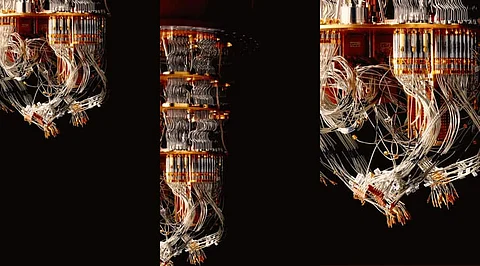

Quantum computing is the latest way to a smarter version of AI. The unprecedented power of quantum computers makes them useful in many scenarios where classical computers would require an impractical amount of time to solve a problem. For example, they could simulate quantum systems, allowing scientists to study in detail the interactions between atoms and molecules. This, in turn, could help in the design of new materials (e.g.e.g., electronics, chemical materials) or new medicines. As they are significantly faster than classical computers, quantum computers will also be far more efficient at searching through a space of potential solutions for the best solution to a given problem. Quantum computers rely on quantum bits – qubits – to process information; in doing so, they use two key quantum mechanical properties: superposition and entanglement. Superposition is the ability of a quantum system to be in multiple states at the same time. Qubits still use the binary 0 and 1 system, but the superposition property allows them to represent a 0, a 1, or both at the same time. Instead of analyzing 0s and 1s sequence by sequence, two qubits in superposition can represent four scenarios at the same time, thus reducing the time needed to process a data set. Quantum computers can thus pave the way for unparalleled innovations in medicine and healthcare, allowing for the discovery of new medications to save lives or of new AI methods to diagnose diseases. They can also support the discovery of new materials, the development of enhanced cybersecurity methods, the elaboration of much more efficient traffic control and weather forecasting systems, and more.
Airbus has launched a quantum computing challenge to encourage the development of quantum solutions in aircraft climb and loading optimization, as well as wing box design optimization. Daimler is working with Google on using quantum computing in the fields of materials science and quantum chemical simulation. The US Department of Energy is funding research projects that could lead to the development of very sensitive sensors (with applications in medicine, national security, and science) and provide insights into cosmic phenomena such as dark matter and black holes. Google, IBM, Intel, Microsoft, and other major tech companies are allocating significant resources to quantum computing research, in their efforts to pioneer breakthroughs in areas such as AI and machine learning, medicine, materials, chemistry, supply chains, and logistics, financial services, astrophysics, and others.
Quantum cryptography is a method used for the secured, encrypted transfer of information. Unlike other forms of cryptography, it ensures security by the laws of physics; it is not dependent on mathematical algorithms and does not secure exchanges of keys. Quantum communication based on quantum cryptography currently qualifies as highly secure, making it impossible to wiretap or intercept. Here, the most well-known application is quantum key distribution (QKD), which relies on the use of quantum mechanical effects to perform cryptographic tasks.
One possible means of quantum communication is quantum teleportation. Although the name can be misleading, quantum teleportation is not a form of the transport of physical objects but a form of communication. This teleportation is the process of transporting a qubit from one location to another without having to transport the physical particle to which that qubit is attached. Even quantum teleportation depends on the traditional communication network, making it impossible to exceed the speed of light.
In January 2019, IBM announced its first commercial quantum computer that can work outside the research lab, but with a power of only 20 qubits. Later on, in October 2019, the company's engineers announced the development of a 53-qubit computer. The start-up Rigetti Computing developed a 32-qubit computer and is now working on a 128-qubit one too. In October 2019, Google claimed that it achieved 'quantum supremacy' with a 53-qubit quantum computing chip that took 200 seconds to carry out a specific calculation which would have taken a classical computer 10 000 years to complete. IBM soon challenged that claim, arguing that the problem solved by Google's computer could also be solved in just 2.5 days through a different classical technique.
Join our WhatsApp Channel to get the latest news, exclusives and videos on WhatsApp
_____________
Disclaimer: Analytics Insight does not provide financial advice or guidance. Also note that the cryptocurrencies mentioned/listed on the website could potentially be scams, i.e. designed to induce you to invest financial resources that may be lost forever and not be recoverable once investments are made. You are responsible for conducting your own research (DYOR) before making any investments. Read more here.
